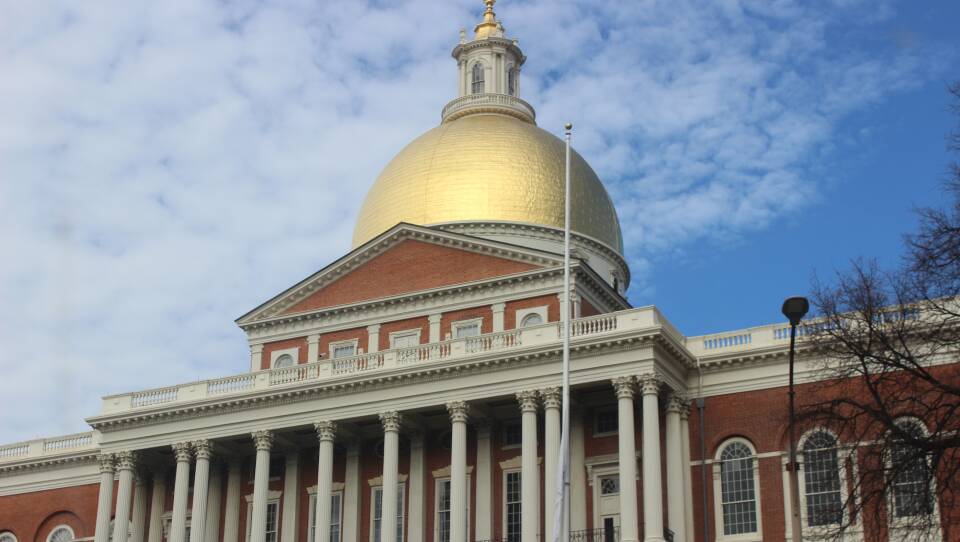The Massachusetts Legislature's Committee on Environment, Natural Resources and Agriculture heard testimony Tuesday on 20 bills covering a wide range of environmental topics. Most addressed some aspect of the growing threat of climate change.
Sen. Marc Pacheco and Rep. Joan Meschino each have introduced bills that would set more aggressive targets for reducing the state's carbon emissions. Under the Global Warming Solutions Act, passed in 2008, the state has committed to reducing greenhouse gas emissions to 80 percent below 1990 levels by 2050. House Bill 832 and Senate Bill 524 would each revise that goal, comitting to "net zero" emissions by 2050.
"The science has now been updated, so we need to update our legislation to reflect what the most recent science is telling us," Pacheco testified to the committee. His bill would set a 2030 target of a 50 percent reduction, and a 2040 target of a 70 percent reduction.
Pacheco said climate change must become a far more urgent priority for the legislature than it's been in the past.
"I've seen comprehensive legislation done in 24 hours, believe it or not, in this building. And yet, we could have something else that is really needed to be done, and we wouldn't see it done for 10 years. And I've seen that happen on this issue."
Meschino's bill would require the state to work on emissions reductions in transportation and home building, in addition to reductions in the energy sector.
"We need a plan. It needs to be comprehensive. It needs to be across all sectors," said Meschino.
Another bill would address financial and economic issues related to climate change.
"First it creates consistency and predictability in planning for climate risks in state licensing, permitting financing and capital projects," Deanna Moran of the Conservation Law Foundation testified, in support of the bill. "Second, it requires investor-owned utilities to proactively plan for climate risks. Third, it re-evaluates the effectiveness of our building codes, which currently don't consider climate risk. Fourth, it ensures that our analysis of and adaptation to climate risks do not harm or burden our most vulnerable communities. And finally, it provides education and training to members of local boards and commissions who are often the decision makers on new development and infrastructure."
Rep. John Barrett testified that one source of emissions that needs to be addressed is idling trains.
"In North Adams, we have a situation during the summertime where trains idle for over 24 hours," he testified. "The same situation in Salem."
His bill would require the state Department of Environmental Protection to do emissions tests on idling trains, and fine companies that are in excess of state limits.
"For too long in this state, we have allowed railroads to get away with this," he said. "And they've done anything they've basically wanted to."
As local governments increasingly face the impacts of climate change, Rep. Nika Elugardo testified that existing state law doesn't clearly let local conservation commissions consider climate change in making decisions. That's addressed in a new bill she filed.
"The measure is not a mandate ... but it allows local jurisdictions and consistencies to decide themselves whether and how to best address climate change, including through local conservation commission actions," said Elugardo. She said that her bill would allow conservation commissions to consider climate change, without increasing their regulatory scope.
Some cities and towns are considering wind turbines as a way to reduce carbon emissions, but some residents, like Neil Anderson of Falmouth, complain about the low frequency sounds they create. "It's very distressing," he said. "You can't sleep." Two house bills, H874 and H891, would address that issue.
"Mass. DEP doesn't have the regulatory resources to actually go in and study the real effects of the low frequency sound, the infrasound, the amplitude modulation," Eleanor Tillinghast of the group Wind Wise Massachusetts testified. "These two bills, very simply, give DEP that authority to regulate it."
Among the other bills is one that would seek to promote healthy soilin agricultural practices to support greater carbon sequestration. Another would assess the amount of carbon in the state's forests and agricultural land and develop a plan to increase their carbon sequestration.





